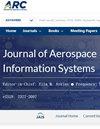单飞行员操作系统设计的预测心理工作量建模方法
IF 1.5
4区 工程技术
Q2 ENGINEERING, AEROSPACE
引用次数: 0
摘要
预测心理负荷模型是评估早期单飞行员操作(SPO)系统设计的重要工具,可用于在原型或模拟器实现之前探索不同功能分配决策的影响。为了构建该模型,本文提出了一种基于任务分析的方法。首先,选取当前双机操作(TCO)的进近降落场景,利用分层任务分析完成TCO的任务描述;其次,利用工作域分析确定了TCO向SPO过渡的功能分配需求,并基于SPO的系统框架提出了原始功能分配决策;最后,基于时间网络和多资源理论,建立了评价不同SPO系统设计方案的预测心理负荷模型。研究人员利用所建立的模型对原有的功能分配决策进行评估,发现所设计的SPO系统在多个时间点存在瞬时工作负载值超过上限的情况。通过分析这些问题产生的原因,研究人员在SPO系统中引入了声音警告和视觉指标,以改进设计决策并对这些决策进行评估。结果表明,重新设计的SPO系统的连续工作负荷曲线和总体平均工作负荷优于现有的TCO系统,也证明了预测心理工作负荷模型可以很好地用于评估早期SPO系统设计。本文章由计算机程序翻译,如有差异,请以英文原文为准。
Predictive Mental Workload Modeling Methodology for Single-Pilot Operations System Design
Predictive mental workload model is an important tool for evaluating early single-pilot operations (SPO) system design and can be used to explore the impact of different function allocation decisions before prototype or simulator implementation. To build this model, this paper proposes a methodology based on task analysis. Firstly, it selects the approach and landing scenario of the current two-pilot operations (TCO) and completes the task description of the TCO using the hierarchical task analysis. Secondly, it identifies the function allocation requirements for the transition from TCO to SPO using the work domain analysis and proposes the original function allocation decisions based on the SPO’s system framework. Finally, it creates the predictive mental workload model for evaluating different SPO system design options based on temporal network and multiple resource theory. The researchers use the created model to evaluate the original function allocation decisions and find that the designed SPO system has instantaneous workload values that exceed the upper limit at multiple time points. By analyzing the causes of these problems, the researchers introduce audible warnings and visual indicators to the SPO system to improve design decisions and evaluate these decisions. The results show that the continuous workload profile and overall average workload of the redesigned SPO system are better than the current TCO system, and also prove that the predictive mental workload model can be well applied to evaluate the system design of early SPO.
求助全文
通过发布文献求助,成功后即可免费获取论文全文。
去求助
来源期刊

Journal of Aerospace Information Systems
ENGINEERING, AEROSPACE-
CiteScore
3.70
自引率
13.30%
发文量
58
审稿时长
>12 weeks
期刊介绍:
This Journal is devoted to the dissemination of original archival research papers describing new theoretical developments, novel applications, and case studies regarding advances in aerospace computing, information, and networks and communication systems that address aerospace-specific issues. Issues related to signal processing, electromagnetics, antenna theory, and the basic networking hardware transmission technologies of a network are not within the scope of this journal. Topics include aerospace systems and software engineering; verification and validation of embedded systems; the field known as ‘big data,’ data analytics, machine learning, and knowledge management for aerospace systems; human-automation interaction and systems health management for aerospace systems. Applications of autonomous systems, systems engineering principles, and safety and mission assurance are of particular interest. The Journal also features Technical Notes that discuss particular technical innovations or applications in the topics described above. Papers are also sought that rigorously review the results of recent research developments. In addition to original research papers and reviews, the journal publishes articles that review books, conferences, social media, and new educational modes applicable to the scope of the Journal.
 求助内容:
求助内容: 应助结果提醒方式:
应助结果提醒方式:


